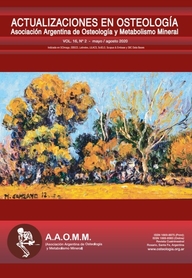Importancia de la Vitamina D en la época del COVID-19
Autores: Mariana Seijo, Beatriz Oliveri
Resumen
Los coronavirus pertenecen a una gran familia de virus (Coronaviridae) que infectan aves y varios mamíferos. El coronavirus actualmente denominado SARS-CoV-2, fue descubierto en diciembre de 2019 en Wuhan, provincia de Hubei, China, y es el agente causal de la epidemia de neumonía atípica actual (COVID-19; Coronavirus Disease 2019).
Los casos más graves presentan un síndrome de dificultad respiratoria aguda que puede conducir a la muerte. La vitamina D (VD), además del efecto bien conocido y positivo sobre la salud ósea y la homeostasis del calcio, tiene efecto pleiotrópico en varios órganos, con distribución casi universal del receptor de VD y de las enzimas de metabolización de 25 hidroxivitamina D (25OHD) en las células del organismo. Estas acciones extraesqueléticas dependen de la síntesis en dichas células del metabolito activo 1,25 dihidroxivitamina D por regulación paracrina y autocrina, dependiente de niveles circulantes óptimos de 25OHD. Por sus acciones inmunomoduladora, antiinflamatoria, antimicrobiana, reguladora del sistema renina-angiotensina-aldosterona, favorecedora de la indemnidad del epitelio respiratorio y la homeostasis redox celular, la VD podría tener efecto protector en la infección por COVID-19.
Entre los grupos de riesgo para COVID-19 figuran los adultos mayores, obesos, diabéticos, hipertensos, con afecciones cardiovasculares, patologías con mayor incidencia en individuos con hipovitaminosis VD.
La suplementación con VD, para alcanzar niveles óptimos de 25OHD de 40-60 ng/ml, podría reducir la incidencia, severidad y riesgo de muerte en la actual pandemia por COVID- 19, como medida complementaria mientras se desarrollan la vacuna y otras medicaciones específicas.
Palabras clave: vitamina D, COVID-19, suplementación, inmunología, SRAA. prevención.






